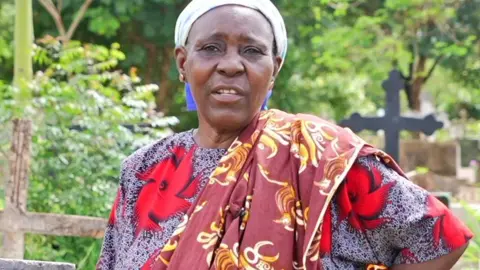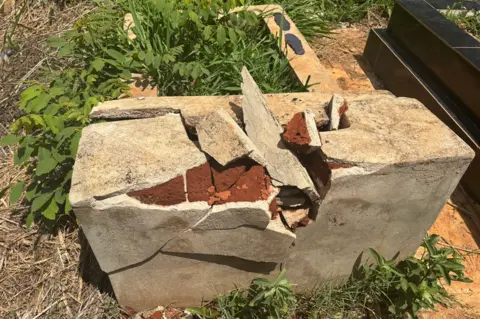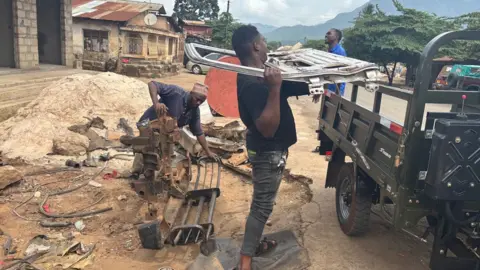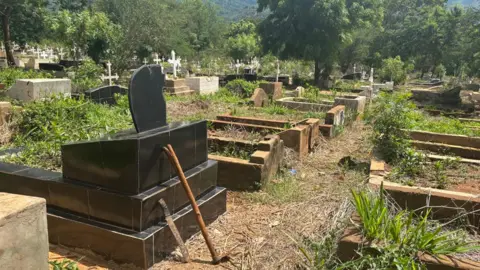BBC News, Morogoro
 BBC
BBCGrave after grave after grave in this cemetery in the eastern Tanzanian city of Morogoro has been vandalised.
In some, there is a gap where a metal crucifix once stood, in others the religious symbol is bent as thieves, who were hoping sell it to scrap merchants, tried and failed to remove it.
More than 250 have been targeted in one small section of the Kola Municipal Cemetery alone.
The crimes mostly happen at night when there is no security there are no cemetery workers around.
They have left families devastated and the sites desecrated, sparking anger.
For more than two decades Pudensiana Chumbi has been going to the cemetery about once a month to visit the graves of her daughter and mother – and to her distress both have been desecrated over the last few years, multiple times.
The first to be targeted was her grave of her mother who had died in 2000.
A few months after the family had managed to save up to replace the stolen cross in late 2021, her daughter’s grave was then damaged. It was nearby and a little older – her daughter had died in 1997 aged 15.
Before Ms Chumbi could make a decision about fixing her daughter’s cross, to her horror the new cross on her mother’s grave was swiped.
In a quandary about what to do next, she felt metal was not an option when it came to replacing her daughter’s cross.
“This is my child’s grave – my fourth child,” she said pointing towards the concrete cross.

The theft of crosses and markers from graves has become a disturbing trend in this part of Tanzania driven by the rising demand for scrap metal.
“The people doing this are cursed because everyone is sad about what is going on,” Ms Chumbi tells the BBC.
“There are some young men who now demand payment to guard graves overnight, especially those with tiles.”
Tiles can also be sold on for people to use as decorations in their home.
Augustine Remmy, Ms Chumbi’s brother, says it is upsetting for the whole community.
“This is too bad… when these areas that deserve respect are subjected to such bad acts, it truly hurts a lot,” he tells the BBC.
The rash of thefts reflects a desperation among some to make some money that overrides ethical concerns about damaging sacred sites.
The criminals can earn somewhere between 700 and 870 Tanzanian shillings ($0.27-$0.34; £0.22-£0.28) per kilogram.
It is not a huge amount of money but it can be enough to pay for a plate of food from a vendor or some locally brewed alcohol.
“Metal dealers often buy without asking questions,” says one man who admitted to the BBC that he had stolen crosses from a cemetery to sell on the scrap metal market.
Agreeing to speak on condition of anonymity, he describes how the thieves would go to welders first who cut the crosses into pieces before taking them to the scrap merchants.

The merchants themselves are faced with the choice of purchasing cheaper stolen goods or following the law.
Izire Ramadhani, a dealer in Morogoro city centre, recalls how in 2023 he, along with some other scrap merchants, caught someone trying to sell a stolen cross and reported him to the authorities.
“In the past, they used to bring us crosses. But then we took one of them to the police, and later he was sentenced to three-and-a-half years in prison – after that, the theft reduced, but now it has returned,” Mr Ramadhani tells the BBC.
He insists that he does not buy stolen goods.
“If a cross is brought here, the person coming to sell to us will be in trouble because we will take him to the police.”
Thieves have also begun targeting other grave markers like tiles and marble decorations, which can easily be sold on to other buyers.
Dr Ndimile Kilatu, Morogoro’s health officer, said the city’s authorities planned to improve cemetery security by introducing fences and guards but warned that “this requires resources and time.
“It is not something that we can do today or tomorrow.”
He also mentioned initiatives to educate scrap metal dealers about the materials that should not be bought, such as grave markers and railway components.

In response to the crimes, Tanzania’s government has also pledged to regulate the scrap metal industry.
Deputy Prime Minister Dotto Biteko has emphasised the need for licensed businesses to adhere to the laws and regulations.
“What is required is just to enforce that and keep the population educated on the same subject. We will keep so educating our people so that we put our infrastructure safe,” he told the BBC.
Religious leaders are also appealing to their communities to do more to prevent those involved in these crimes from carrying them out.
Pastor Steven Msigara from the Jesus Assembles of God in Morogoro has called for a united effort to educate the youth on the need to respect sacred places.
“Together, we must restore their dignity, we know some youth are exposed to bad acts but we can return them to the right track,” he says.
For relatives of those whose graves have been desecrated there is a feeling of frustration.
Ms Chumbi wants more money to be spent on security at the cemeteries as well as a commitment to look after the sites with care befitting a place where loved ones are laid to rest.
She is in the process of replacing her mother’s cross for a second time – and, as in her daughter’s case – is opting for concrete.
More BBC stories from Tanzania:
 Getty Images/BBC
Getty Images/BBC














